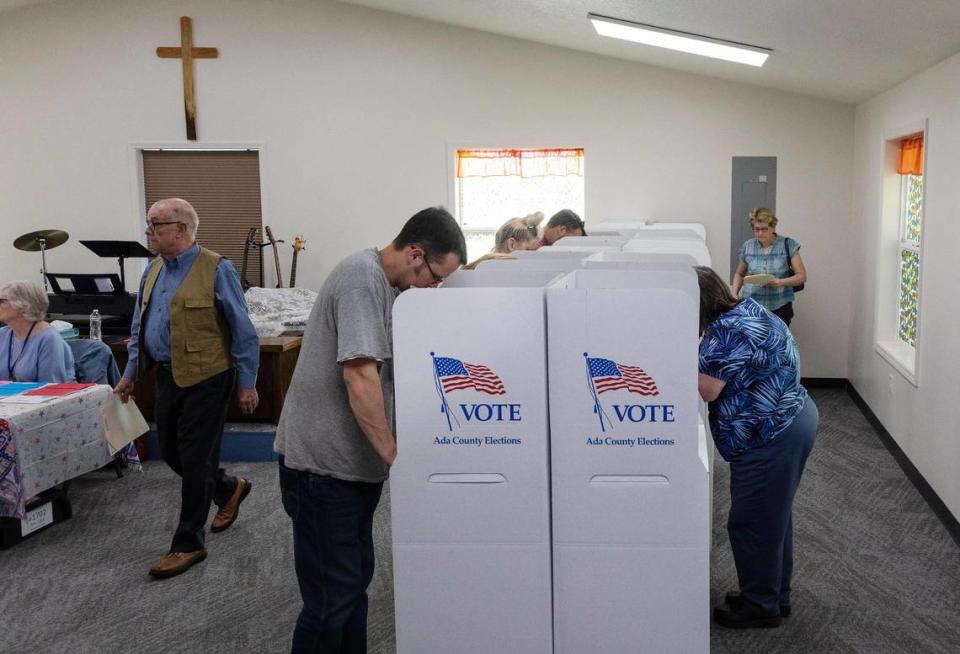Gains in Idaho House, losses in the Senate. What does it mean? Disaster, most likely
- Oops!Something went wrong.Please try again later.
Tuesday was a mixed day for legislative results.
On the one hand, lots of far-right incumbents in the House appear to have been beaten by more moderate challengers, especially in Eastern Idaho.
There Rep. Karey Hanks was ousted by former Rep. Jerald Raymond’s effort to reclaim his seat, and the same seems to have happened in former Rep. Britt Raybould’s bid to take back her seat from Rep. Ron Nate (though that outcome is extremely close and likely to be recounted). Moderate Josh Wheeler also appears to have unseated Rep. Chad Christensen, an Oath Keeper and one of the most extreme members of the House.
House moderates even saw some gains in North Idaho, with a victory by Mark Sauter for an open seat.
Before Tuesday’s election, the median House member — the member who might be most likely to cast a deciding vote — was someone like Rep. Mike Moyle. But my best guess is that in the next term that will be someone more like Rep. John Vander Woude, or if Democrats do especially well in the general election, even someone as moderate as Rep. Lance Clow.
Idaho Senate
The exact opposite happened in the Senate, however, with multiple relatively moderate Republicans being ousted by far-right challengers.
Scott Herndon defeated Sen. Jim Woodward, former Rep. Codi Galloway defeated Sen. Fred Martin and longtime Sen. Jim Patrick, just 40 votes behind, appears to have been beaten by extremist Glenneda Zuiderveld.
With nearly a third of the Senate retiring, much of the vacuum was also filled by far-right candidates. Tax resister Phil Hart gained an open seat, Chris Trakel defeated former Rep. Greg Chaney and Ben Toews beat Tara Malek.
The swing in the Senate will be dramatic and destabilizing.
In the last session, the median senator was someone like Woodward. Unless Democrats pull off big, unexpected wins in the general, someone more like Sen. Lori Den Hartog is likely to be near the ideological center of the Senate.
What it means for legislation
With a complex mixture of wins and losses, what is likely to be the net impact on state policy?
As I look at the matter, things are likely to get much worse.
True, moderate gains in the House mean a few bills that passed in that chamber this year would likely fail in 2023.
For example, H439, which would have banned unaffiliated voters from affiliating at the polls, passed the House 36-32. It would probably not pass in this new House. The same goes for H693, Rep. Priscilla Giddings’ bill to ban ballot drop boxes. And H824, the original Idaho Commission for Libraries budget, likely would have narrowly passed instead of failing 33-36.
But that’s about the extent of it, along with perhaps a half-dozen other bills.
Compared to what may have been lost in the Senate’s filtering capability, the policy impact of moderate gains in the House is likely to be almost undetectable. The House passed 67 bills (more than 10% of the total bills printed) last year that never made it to the Senate floor, including both the aforementioned voter affiliation and the drop box bills.
The Senate blocked the House bill to ban rental fee regulation like that enacted by Boise, the bill to decriminalize militias, the bill to allow bond elections only once a year, the bill to have state funds invested in gold bars, the bill to ban local governments from renaming historic monuments, the bill to make it illegal for employers to require the COVID-19 vaccine and the bill to remove the attorney general from the Constitutional Defense Council. Many of these 67 bills had margins in the House that will easily survive the gains by moderates there.
Will far-right members recently elected to the Senate moderate their politics?
During endorsement interviews, the Statesman editorial board asked many Senate candidates whether there was something about the Senate itself that encourages moderation, or if it is just that the Senate happens to be made up of more moderate members than the House. Many said they think the Senate culture naturally encourages consensus-based policymaking.
That’s possible.
The hypothesis is about to face a difficult real-world test.
I am not optimistic.


